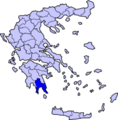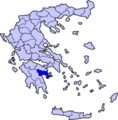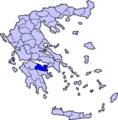Doric Greek facts for kids
Quick facts for kids Doric Greek |
|
|---|---|
| Δωρισμός | |
| Region | Peloponnese, Crete, Rhodes, Sicily, Italy |
| Era | c. 800–100 BC; changed into the Tsakonian language |
| Language family |
Indo-European
|
| Linguist List | grc-dor |
Doric or Dorian (Ancient Greek: Δωρισμός, romanized: Dōrismós) was a special way of speaking Ancient Greek. Think of it like different accents or versions of a language. It was spoken by a group of people called the Dorians. They lived in parts of Greece, especially in the west. You could also hear Doric in some areas of Southern Italy and on the island of Sicily.
Contents
What Was Doric Greek?
Doric Greek was one of the main dialects of Ancient Greek. A dialect is a form of a language spoken in a certain area or by a certain group of people. It has its own unique words, sounds, and grammar rules. Doric was different from other Greek dialects like Attic Greek, which was spoken in Athens. Many important ancient texts were written in different Greek dialects.
Where Was Doric Greek Spoken?
The Dorians were a powerful group of people in ancient Greece. They spread their language to many places.
- Mainland Greece: Doric was widely spoken in the Peloponnese region. This includes famous places like Sparta and Corinth.
- Islands: It was also the main language on large islands like Crete and Rhodes.
- Southern Italy and Sicily: The Dorians also set up colonies in Southern Italy and on the island of Sicily. This is why Doric Greek was spoken there too. These areas were part of what was called "Magna Graecia," or "Great Greece."
Why Was Doric Greek Important?
Doric Greek was important for several reasons.
- Literature: Many famous ancient Greek poems and songs were written in Doric. For example, the works of poets like Pindar often used Doric forms.
- History: Studying Doric helps us understand the history of ancient Greece. It shows how different groups of people lived and communicated.
- Modern Languages: While Doric Greek is no longer spoken today, it influenced other languages. The Tsakonian language, spoken in a small part of the Peloponnese, is thought to be a descendant of Doric Greek. This means it evolved directly from it over thousands of years.
Doric Greek shows us how rich and varied the ancient world was. It reminds us that even ancient languages had many different ways of being spoken.
Images for kids
See also
 In Spanish: Griego dórico para niños
In Spanish: Griego dórico para niños
 | Janet Taylor Pickett |
 | Synthia Saint James |
 | Howardena Pindell |
 | Faith Ringgold |





